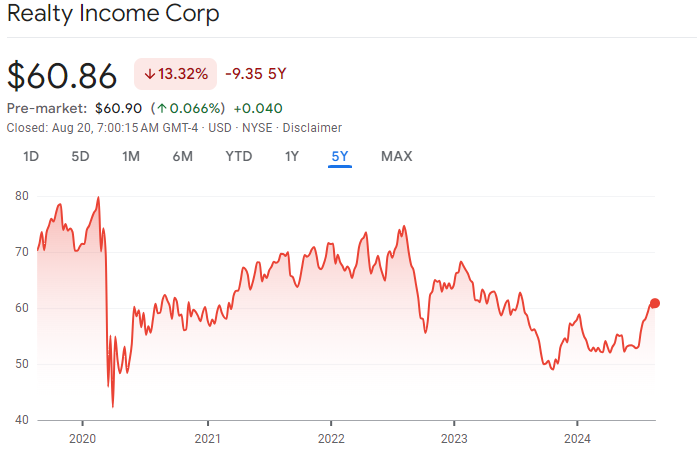Five years ago, Realty Income $O sold at $70/share.
Today, the stock sells at $60/share.
Someone who invested 5 years ago and reinvested those dividends ended up with a total return of 8.50% over those 5 years.
However, FFO/share increased from $3.12 in 2018 to $4.08 in 2023. Forward FFO for 2024 is at $4.22.
Monthly dividends went from $0.2193 in Aug 2019 to $0.263 in Aug 2024.
What happened?
As we have discussed before, total returns are a function of:
1. Dividends
2. FCF/Share Growth (in case of REITs – FFO/Share)
3. Changes in valuation
Long-term investors care about the fundamental sources of returns. Those are dividends and FFO/share growth.
In the short term however, changes in valuation could impact returns. Even if a business performs well, a shrinking in valuation multiples could pull returns down. If the valuation increases, then the returns are pulled forward.
As a long-term investor, I care about fundamental returns, because ultimately, they drive long-term returns. Valuation multiples are affected by investor emotions, which are unpredictable. They are to be taken advantage of, but not really followed blindly.
In the case of Realty Income, the business grew FFO/share by 30.76% since 2018. It grew dividends by 19.92%.
However, the stock price declined by 14.30%. Including reinvested dividends, investors received a total return of 8.50%.
The reason for the decline in share price is the shrinking of the valuation multiple.
The stock sold at an FFO multiple of 22.43 about 5 years ago. It had a dividend yield of 3.75%.
Today, it sells at an FFO multiple of 14.70. It has a dividend yield of 5.25%.
In fact, Realty Income sells at the lowest valuation in quite some time. This chart below shows the valuation range for Realty Income over the past decade.
The reason for the poor performance in the stock was because investors were over excited about the stock five years ago, and were willing to bid it up. Perhaps that was also because interest rates were low. Investors were willing to pay a premium valuation for this REIT five years ago.
Today however, investors are not willing to pay premium valuation for this REIT. Interest rates are also higher as well.
Predicting investor moods is very hard. Some times they are overly exuberant about a company (like they were about Realty Income in 2019). Other times, they are not excited at all about it (like today).
I believe that the mutliple today appears fine. I have no idea if the FFO multiple would shrink or grow in the future.
I do believe Realty Income will continue to grow FFO/share over time, and its investors would continue to receive their monthly and growing dividends over time. The company has been successful in doing just that for about 30 years as a publicly traded company, through various boom/bust cycles.
Relevant Articles:
– Six Things to Look For in a Real Estate Investment Trust (REIT)







